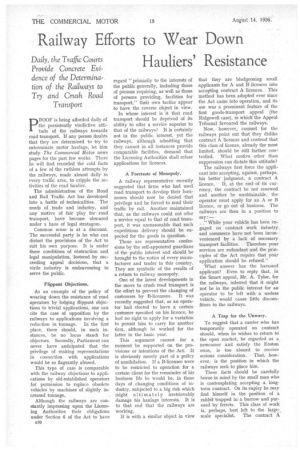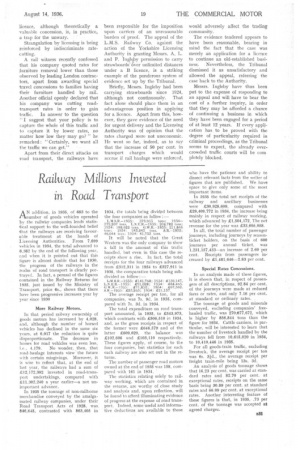Railway Efforts to Wear Down Hauliers' Resistance
Page 36

Page 37

If you've noticed an error in this article please click here to report it so we can fix it.
Daily, the Traffic Courts Provide Concrete Evidence of the Determination of the Railways to Try and Crush Road Transport
pROOF is being afforded daily of the persistently vindictive attitude of the railways towards road transport. If any person doubts that they are determined to try to exterminate motor haulage, let him study The Commercial Motor news pages for the past few weeks. There he will find recorded the cold facts of a few of the ruthless attempts by the railways, made almost daily in every traffic area, to cripple the activities of the road haulier.
The administration of the Road and Rail Traffic Act has developed into a battle of technicalities. • The needs of , trade and industry, and any motive of fair play for road transport, have become obscured under a haze of legal stratagem.
Common sense is at a discount. The successful party is he who can distort the provisions of the Act to suit his own purpose. It is under these conditions of obstruction and legal manipulation, fostered by succeeding appeal decisions, that a virile industry is endeavouring to serve the public.
Flippant Objections.
As an example of the policy of wearing down the resistance of road operators by lodging flippant objections to trivial applications, one can cite the case of opposition by the railways to applications involving a reduction in tonnage. In the first place, there should, in such instances, be no locus standi for objectors. Secondly, Parliament can never have anticipated that the privilege of making representations in connection with applications would be so flagrantly abused.
This type of case is comparable with the railway objections to applications by old-established operators for permission to replace obsolete vehicles by machines of slightly increased tonnage.
Although the railways are constantly impressing upon the Licensing Authorities their obligations under Section 6 of the Act to have regard "primarily to the interests of the public generally, including those of persons requiring, as well as those of persons providing, facilities for transport," their own tactics appear to have the reverse object in view.
In whose interest is it that road transport should be deprived of its ability to offer a service superior to that of the railways? • It is certainly not in the public interest, yet the railways, although admitting that they cannot in all instances provide comparable facilities, demand that the Licensing Authorities shall refuse applications for licences.
A Foretaste of Monopoly.
A railway representative recently suggested that firms who had used road transport to develop their businesses should now be denied that privilege and he forced to send their traffic by rail. Another maintained that, as the railways could not offer a; service equal to that of road transport, it was unreasonable that such expeditious delivery should be expected for the goods in question.
Those are representative confessions by the self-appointed guardians of the public interest and should be brought to the notice of every manufacturer and trader in this country. They are symbolic of the results of a return to railway monopoly.
One of the latest developments in the move to crush road transport is the effort to prevent the changing of customers by B-licensees. It was recently suggested that, as an operator had elected to have a certain customer specified on his licence, he had no right to apply for a variation to permit him to carry for another firm, although he worked for the latter in the basic year.
This argument cannot for a moment be supported on the provisions or intentions of the Act. It is obviously merely part of a policy of annihilation. If a B-licensee were to be restricted to operation for a certain client for the remainder of his business life he would be, in these days of changing conditions of industry, subjected to a big risk which might ultimately irretrievably damage his haulage interests. It is to that end that the railways are working.
It is with a similar object in view
that they are bludgeoning small applicants for A and B licences into accepting contract A licences. This method has been adopted ever since• the Act came into operation, and its use was a prominent feature of the first goods-transport appeal (the Ridgewell case), in whichthe Appeal Tribunal favoured the railways.
Now, however, counsel for the railways point out that they dislike contract A licences and contend that this class of licence, already the most limited, should be still further controlled. What motive other than suppression can dictate this attitude?
The railways first force the applicant into accepting, against, perhaps, his better judgment, a contract A
licence. If, at the end of its currency, the contract be not renewed and another be unobtainable, the operator must apply for an A Or B licence, or go out of business. The railways are then in a position to say:—
. " While your vehicle has been engaged on contract work industry and commerce have not been inconvenienced by a lack of necessary transport facilities. Therefore your services are redundant and the principles of the Act require that your application should be refused."
What answer has the harassed applicant? Even to reply that, in the Smart appeal, Mr. A. Tylor, for the railways, inferred that it might not be in the public interest for an operator to be left with a useless vehicle, would cause little discomfiture to the railways.
A Trap for the Unwary.
To suggest that a carrier who has temporarily operated on contract should, when he wishes to return to the open market, be regarded as a newcomer and satisfy the Enston onus, is too absurd to receive serious consideration. That, however, is the position in which the railways seek to place him.
These facts should be carefully borne in mind by the small man who is contemplating accepting a longterm contract. On its expiry he may find himself in the position of a rabbit trapped in a burrow and pursued by ferrets. This class of work is, perhaps, best left to the largescale specialist. The contract A
licence, although theoretically a valuable concession, is, in practice, a trap for the unwary.
Strangulation by licensing is being reinforced by indiscriminate ratecutting.
A rail witness recently confessed that his company quoted rates for furniture removal lower than those observed by leading London contractors, apart from awarding special travel concessions to families having their furniture handled by rail. Another official openly declared that his company was cuffing roadtransport rates in order to gain traffic. In answer to the question " I suggest that your policy is to capture the whole of this traffic and to capture it by lower rates, no matter how low they may go? " he remarked: "Certainly, we want all the traffic we can get."
Apart from their direct attacks on road transport, the railways have
been responsible for the imposition upon carriers of an unreasonable burden of proof. The appeal of the L.M.S. Railway Co. against the action of the Yorkshire Licensing Authority in granting Messrs. A. L. and P. Ingillby permission to carry strawboards over unlimited distances under a B licence, is a striking example of the ponderous system of evidence set up by the Tribunal.
Briefly, Messrs. lngleby had been carrying strawboards since 1924, although not continuously. That fact alone should place them in an advantageous position in applying for a licence. Apart from this, however, they gave evidence of the need for urgent delivery and the Licensing Authority was of opinion that the rates charged were not uneconomic. He went so far, indeed, as to say that the increase of 50 per cent. in transport charges which would accrue if rail haulage were enforced, would adversely affect the trading community.
The evidence tendered appears to have been reasonable, bearing in mind the fact that the case was merely an application for a licence to continue an old-established business. Nevertheless, the Tribunal dismissed it as unsatisfactory and allowed the appeal, referring the case back to the Authority.
Messrs. Ingleby have thus been put to the expense of responding to an appeal and will have to bear the cost of a further inquiry, in order that they may be afforded a chance of continuing a business in which they have been engaged for a period of at least 12 years. If every application has to be proved with the degree of particularity required in criminal proceedings, as the Tribunal seems to expect, the already overcrowded traffic courts will be corn pletely blocked.












































































